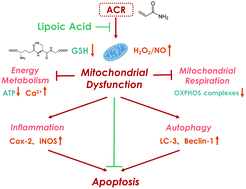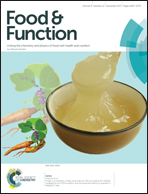Protective effects of lipoic acid against acrylamide-induced neurotoxicity: involvement of mitochondrial energy metabolism and autophagy
Abstract
Acrylamide (ACR) is a chronic neurotoxin that is generated in high-starch foods during heat processing. Alpha-lipoic acid (LA) is an antioxidant that occurs in most plants and animals. The objective of this study was to reveal the mechanism of ACR-triggered neurotoxicity and identify the protective role of LA in SH-SY5Y cells. In this study, LA restored ACR-stimulated depletion of glutathione content and mitochondrial membrane potential, moderated the activation of inflammatory pathways, and recovered the Keap1/Nrf2 pathway. Moreover, LA upregulated the activities of oxidative phosphorylation complexes and diminished ACR-induced variation in AMPK/GSK3β, Ca2+ disturbance, and ATP depletion. The Sirt1/PGC-1α pathway was inhibited by ACR. Notably, autophagy was activated in the mitochondria-mediated apoptosis induced by ACR, which was also blocked by LA. Overall, our study demonstrated the pivotal roles of the mitochondrial energy metabolism and autophagy in the protective effects of LA and cytotoxicity of ACR in SH-SY5Y cells.



 Please wait while we load your content...
Please wait while we load your content...